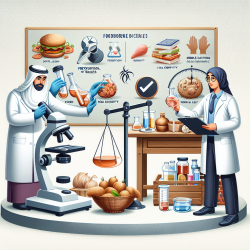Food safety is a global concern, with developing regions like the Middle East facing unique challenges due to limited disease surveillance and prevention strategies. The World Health Organization (WHO) reports that the Middle East and North Africa (MENA) region has the third highest burden of foodborne diseases globally. This blog explores how practitioners can improve their skills by implementing research findings on foodborne diseases in the Middle East.
The Current Landscape
The MENA region's food safety issues are exacerbated by factors such as water scarcity, reliance on imported foods, and political instability. Countries like Syria, Yemen, and Iraq face significant challenges due to ongoing conflicts that impact food security and public health infrastructure. Gastrointestinal infections from pathogens like Salmonella, Shigella, and hepatitis A are common, with children being particularly vulnerable.
Research Insights and Practical Applications
A recent study titled "Foodborne Disease in the Middle East" highlights several key areas where practitioners can focus their efforts:
- Surveillance and Reporting: Establishing robust disease surveillance systems is crucial for early detection and response to outbreaks. Practitioners should advocate for improved data collection and reporting mechanisms to better understand the burden of foodborne diseases.
- Education and Training: Food handlers' knowledge of hygiene practices is often limited. Implementing comprehensive training programs can help reduce contamination risks in foodservice establishments.
- Water Management: With water scarcity being a critical issue, innovative projects like Qatar's Sahara Forest Project demonstrate how seawater can be used for sustainable agriculture. Practitioners should explore similar solutions to enhance local food production.
- Policy Development: Encouraging governments to establish or strengthen food safety authorities can lead to more effective regulation and oversight. Collaboration between public health agencies, industry, and academia is essential for developing cohesive policies.
Encouraging Further Research
The complexity of foodborne diseases in the Middle East requires ongoing research to identify effective prevention strategies. Practitioners should engage with academic institutions and international organizations to support studies that address regional challenges. By staying informed through conferences, publications, and webinars, professionals can contribute to a safer food environment.
To read the original research paper on this topic, please follow this link: Foodborne Disease in the Middle East.










